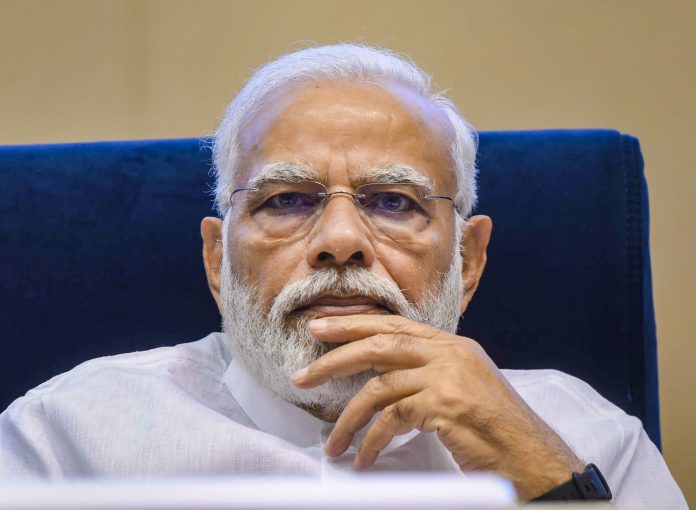NEW DELHI, Jun 3: Prime Minister Narendra Modi has called for the nation to “reassess outdated thinking and beliefs” and free “our society from the pressure of professional pessimists”, asserting that the foundation for a “Viksit Bharat” must be laid in the 25 years in the run up to the centenary of India’s independence.
Click here to connect with us on WhatsApp
“The world of the 21st century is looking towards Bharat with many hopes. And we will need to make several changes to move forward in the global scenario. We also need to change our traditional thinking regarding reform. Bharat cannot limit reform to just economic reforms,” he said in an article which he had penned on June 1 on his flight to Delhi from Kanyakumari.
He had reached Kanyakumari on May 30 on a spiritual sojourn after the Lok Sabha polls campaign ended.
Modi called upon people to move forward in every aspect of life towards the direction of reform.
In the write-up, which appeared in many newspapers on Monday, Modi said India’s reforms should also align with the aspirations of a ‘Viksit Bharat’ (developed India) by 2047, stating that reform can never be a unidimensional process for any country.
“Therefore, I have laid out the vision of reform, perform, and transform for the country. The responsibility of reform lies with leadership. Based on that, our bureaucracy performs, and when the people join in with the spirit of Jan Bhagidari, we witness a transformation taking place,” he said.
The article appeared a day before the counting of votes for the Lok Sabha elections takes place, with exit polls predicting that Modi is set to retain power for a record-equalling third term with a big majority for the ruling BJP.
In a clear elucidation of his government’s agenda if it is re-elected, he said, “We must make excellence the fundamental principle to make our country a ‘Viksit Bharat’. We need to work quickly in all four directions: Speed, Scale, Scope, and Standards. Alongside manufacturing, we must also focus on quality and adhere to the mantra of ‘zero defect-zero effect’.”
He added, “As a nation, we also need to reassess outdated thinking and beliefs. We need to free our society from the pressure of professional pessimists. We must remember that freedom from negativity is the first step towards achieving success. Success blossoms in the lap of positivity.”
The prime minister said his faith, devotion and belief in the infinite and eternal power of ‘Bharat’ are growing day by day. Over the past 10 years, he has seen the country’s capability grow even more and has experienced it firsthand.
He said, “Just as we utilised the fourth and fifth decades of the 20th century to impart a new momentum to the freedom movement, we must lay the foundation for a ‘Viksit Bharat’ in these 25 years of the 21st century. The freedom struggle was a time that called for great sacrifices. The present times call for great and sustained contributions from everyone.”
The prime minister meditated at the Rock Memorial, a monument built in tribute to Swami Vivekananda who had engaged himself in a spiritual exercise there.
Modi said India’s governance model has become an example for many countries around the world, with over 25 crore people rising above poverty in just 10 years in an unprecedented development. Innovative practices such as pro-people good governance, aspirational districts, and aspirational blocks are being discussed globally today, he said, claiming his government’s efforts have inspired the world by prioritizing individuals standing at the last rung of society.
The ‘Digital India’ campaign is now an example for the entire world, showing how people can use technology to empower the poor, bring transparency, and ensure their rights, he said, adding that inexpensive data is becoming a means of social equality by ensuring the reach of information and services to the poor”.
The whole world is witnessing and studying the democratisation of technology, and major global institutions are advising many countries to adopt elements from our model,” he said.
He added, “Today, Bharat’s progress and rise are not just a significant opportunity for Bharat alone, but also a historic opportunity for all our partner countries around the world. Since the success of the G-20, the world has been increasingly envisioning a bigger role for Bharat.”
India is now being acknowledged as a strong and important voice of the Global South, he said. “The African Union has become a part of the G-20 group at the initiative of Bharat. This is going to be a crucial turning point for the future of African countries.”
India’s development trajectory fills people with pride and glory, but at the same time, it also reminds the 140 crore citizens of their responsibilities, he said.
“Now, without wasting a single moment, we must step forward towards greater duties and larger goals. We need to dream new dreams, convert them into reality and begin living those dreams,” he said.
“The world of the 21st century is looking towards Bharat with many hopes. And we will need to make several changes to move forward in the global scenario. We also need to change our traditional thinking regarding reform.
“Bharat cannot limit reform to just economic reforms. We must move forward in every aspect of life towards the direction of reform. Our reforms should also align with the aspirations of a ‘Viksit Bharat’ (developed India) by 2047,” he said. (Agencies)


